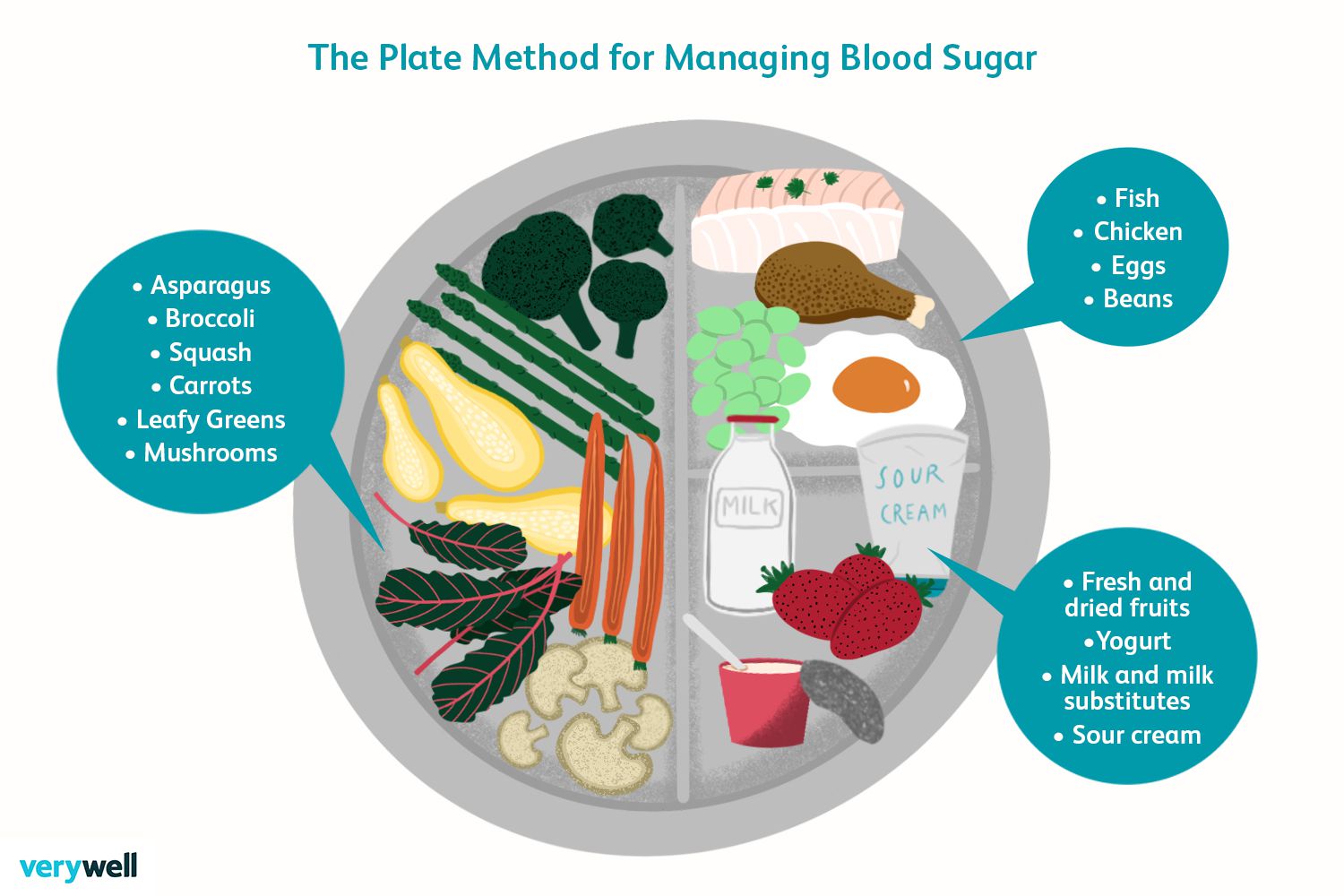Impact Of Chicken On Blood Sugar Levels

Chicken as a food choice has a minimal impact on blood sugar levels. Due to its low carbohydrate content, chicken does not directly cause a significant spike in blood sugar levels. The protein found in chicken can actually help moderate blood sugar rises when consumed as part of a mixed meal. However, it is important to consider other factors such as cooking methods and portion sizes. Incorporating a variety of vegetables and whole grains alongside chicken can help maintain stable blood sugar levels and support overall health.
Does Chicken Raise Blood Sugar?
No, chicken does not raise blood sugar levels significantly. Chicken is a low-carbohydrate protein source, which means it has minimal impact on blood sugar. In fact, the protein in chicken can help moderate blood sugar rises when consumed as part of a mixed meal. It is important to consider other factors such as cooking methods and portion sizes when incorporating chicken into a balanced diet. Adding vegetables and whole grains alongside chicken can help maintain stable blood sugar levels and support overall health.
Nutritional Content Of Chicken And Its Impact On Blood Sugar
Chicken is a lean source of protein that is low in carbohydrates, making it an excellent choice for individuals concerned about their blood sugar levels. A 100-gram serving of skinless, boneless chicken breast contains about 165 calories, 31 grams of protein, and only a negligible amount of carbohydrates. The protein in chicken helps stimulate the release of insulin, which helps regulate blood sugar levels. Additionally, chicken is also a good source of essential nutrients such as vitamins B6 and B12, niacin, and selenium, all of which contribute to overall health and well-being. Incorporating chicken into a balanced diet can support stable blood sugar levels and provide important nutrients for optimal health.
Comparison With Other Protein Sources

When comparing chicken to other protein sources, it is important to consider their impact on blood sugar levels. Red meat, for example, contains higher levels of saturated fats, which can adversely affect insulin sensitivity and increase the risk of elevated blood sugar levels. Plant-based proteins, such as legumes and tofu, can be excellent alternatives for individuals concerned about blood sugar management. These plant-based proteins typically have a higher fiber content, which can help slow down the absorption of glucose and promote better blood sugar control. Overall, incorporating a variety of protein sources into a balanced diet is key for maintaining stable blood sugar levels.
Chicken Vs. Red Meat: Impact On Blood Sugar
One important comparison to consider when examining the impact of chicken on blood sugar levels is its difference from red meat. Red meat consumption has been associated with higher levels of saturated fats, which can negatively affect insulin sensitivity and increase the risk of elevated blood sugar levels. In contrast, chicken is generally lower in saturated fat and can be a healthier protein option for individuals concerned about blood sugar management. Incorporating chicken into meals instead of red meat may help maintain stable blood sugar levels and promote better overall health.
Chicken Vs. Plant-based Proteins: Effect On Blood Sugar Levels
When comparing chicken to plant-based proteins, such as beans, lentils, and tofu, the effect on blood sugar levels can vary. Plant-based proteins generally have a lower glycemic index, meaning they have a slower and more gradual impact on blood sugar compared to chicken. This is because plant-based proteins often contain higher amounts of fiber, which slows down digestion and the release of glucose into the bloodstream. Therefore, incorporating plant-based proteins into a meal can help stabilize blood sugar levels and promote better glycemic control.
Incorporating Chicken In A Balanced Diet

When it comes to incorporating chicken into a balanced diet, moderation and variety are key. Including chicken as part of a diverse meal plan that includes a range of vegetables, whole grains, and legumes ensures that you’re getting a spectrum of nutrients while managing your blood sugar effectively. Opt for lean cuts of chicken and avoid deep-frying or using high-fat sauces and dressings. Grilling, baking, or roasting chicken are healthier cooking methods that can help maintain its nutritional integrity. Remember to practice portion control and balance your meals with other healthy protein sources to achieve a well-rounded diet.
Benefits Of Including Chicken In A Balanced Diet
Including chicken in a balanced diet offers numerous benefits. Chicken is a great source of lean protein, which is essential for building and repairing tissues and maintaining a healthy immune system. It also contains important vitamins and minerals like vitamin B6, which supports brain health, and selenium, which has antioxidant properties. Additionally, chicken is low in saturated fats, making it a heart-healthy protein option. Incorporating chicken into meals can provide a satisfying and nutritious addition to a well-rounded diet, helping to support overall health and blood sugar management.
Portion Control And Cooking Methods For Managing Blood Sugar
Portion control plays a crucial role in managing blood sugar levels when incorporating chicken into a balanced diet. It is important to consume appropriate serving sizes to prevent overeating and avoid blood sugar spikes. Aim for a palm-sized portion of chicken, which is approximately 3-4 ounces, as part of your meal.
In terms of cooking methods, opt for healthier options like grilling, baking, or steaming instead of frying. This reduces the intake of unhealthy fats and calories. Avoid adding sugary sauces or marinades, as they can raise blood sugar levels. By practicing portion control and choosing healthier cooking methods, you can effectively manage blood sugar levels while enjoying the benefits of incorporating chicken into your diet.
Potential Factors Affecting Blood Sugar Response

There are several factors that can affect an individual’s blood sugar response to chicken consumption. These factors include the preparation methods used, such as grilling, baking, or frying, as well as the addition of sauces or marinades. The frequency of chicken consumption can also play a role, as regular consumption may have a cumulative effect on blood sugar levels. Additionally, individual differences, such as metabolism and insulin sensitivity, can influence how the body responds to chicken. It is important for individuals to be mindful of these factors and monitor their blood sugar levels to maintain optimal control.
Source:
Preparation Methods And Blood Sugar Impact
The method of preparing chicken can have an impact on blood sugar levels. Frying chicken, especially in batter or bread crumbs, can increase the glycemic index and cause a more significant rise in blood sugar compared to other methods like grilling or baking. Additionally, adding high-sugar sauces or marinades to chicken dishes can further elevate blood sugar levels. It is important to choose healthier cooking methods, such as grilling or baking, and opt for low-sugar or homemade sauces to minimize the impact on blood sugar. Monitoring portion sizes and pairing chicken with fiber-rich vegetables can also help regulate blood sugar levels.
Frequency Of Chicken Consumption And Blood Sugar Control
The frequency of chicken consumption can also play a role in blood sugar control. Incorporating chicken into a balanced diet on a regular basis can help regulate blood sugar levels. However, it is important to practice portion control and avoid excessive consumption. Consuming chicken in moderation, along with a variety of other nutritious foods, can contribute to better overall blood sugar management. It is recommended to consult with a healthcare professional or registered dietitian to determine the optimal frequency and portion size of chicken intake based on individual health needs.
Professional Perspectives

Professional Perspectives: Experts in the field of nutrition and diabetes management provide insights into the impact of chicken on blood sugar levels. Registered dietitians emphasize that chicken, when prepared in a healthy way, can be included in a balanced diet for individuals with diabetes. They recommend opting for grilling, baking, or steaming rather than frying chicken to avoid adding unnecessary fats and carbohydrates. Additionally, healthcare professionals stress the importance of portion control and pairing chicken with low-glycemic index carbohydrates and vegetables to further stabilize blood sugar levels. Consultation with a healthcare provider is crucial for personalized guidance on incorporating chicken into a diabetic-friendly diet.
Expert Opinions On Chicken Consumption And Blood Sugar Levels
Registered dietitians and healthcare professionals generally agree that chicken can be a part of a balanced diet for individuals with diabetes. According to experts, chicken’s low carbohydrate content and high protein content make it a favorable choice for managing blood sugar levels. They recommend preparing chicken in healthier ways such as grilling, baking, or steaming to avoid adding unnecessary fats and carbohydrates. Additionally, portion control and pairing chicken with low-glycemic index carbohydrates and vegetables are emphasized. However, it is always important to consult with a healthcare provider for personalized guidance on incorporating chicken into a diabetic-friendly diet.
Research Studies On The Relationship Between Chicken And Blood Sugar
Several research studies have been conducted to explore the relationship between chicken consumption and blood sugar levels. One study published in the Journal of the American Dietetic Association found that poultry consumption was associated with lower fasting glucose levels in individuals with type 2 diabetes. Another study published in the American Journal of Clinical Nutrition suggested that including lean meats like chicken in a high-protein diet can improve glycemic control. These studies provide evidence that chicken can be a favorable protein source for managing blood sugar levels.
Conclusion And Recommendations

In conclusion, the impact of chicken on blood sugar levels can vary depending on several factors such as cooking methods and portion sizes. While chicken is a lean source of protein and generally considered a healthy food choice, it does not directly cause a significant spike in blood sugar. Including chicken as part of a balanced diet can provide essential nutrients and contribute to blood sugar management. It is recommended to pair chicken with a variety of vegetables, whole grains, and legumes to ensure a well-rounded meal. Additionally, practicing portion control and choosing healthier cooking methods can further support blood sugar control.
Summary Of The Impact Of Chicken On Blood Sugar
Chicken is a lean source of protein that does not directly raise blood sugar levels significantly. Its low carbohydrate content and ability to moderate blood sugar spikes make it a suitable choice for individuals managing diabetes or aiming to maintain stable blood sugar levels. The impact of chicken on blood sugar can be influenced by factors such as cooking methods and portion sizes. To ensure optimal blood sugar management, it is recommended to incorporate chicken into a balanced diet that includes a variety of vegetables, whole grains, and legumes.
Tips For Incorporating Chicken Into A Diabetic-friendly Diet
- Opt for lean cuts of chicken: Choose skinless chicken breasts or turkey as they have lower fat content compared to darker meat or cuts with skin. This helps in managing weight and reducing the risk of insulin resistance.
- Watch portion sizes: Stick to appropriate serving sizes of chicken, which is about 3-4 ounces per meal. Avoid oversized portions, as excess protein intake may have a small impact on blood sugar levels.
- Choose healthy cooking methods: Avoid deep frying chicken, which can increase its fat content. Instead, opt for baking, grilling, or sautéing with minimal oil. This helps in maintaining the nutritional value of chicken without adding unnecessary calories.
- Pair chicken with balanced sides: Incorporate chicken into a balanced meal by pairing it with non-starchy vegetables, whole grains, and legumes. This combination provides a good balance of nutrients and helps slow down the digestion and absorption of carbohydrates, resulting in better blood sugar control.
- Limit processed chicken products: Processed chicken products, such as nuggets or breaded, fried options, may contain added sugars or unhealthy fats. It is best to opt for fresh, unprocessed chicken for better control of blood sugar levels.
- Monitor your blood sugar levels: Even though chicken is generally considered a safe food for diabetes management, it is essential to monitor your blood sugar levels after consuming chicken and adjust your diet accordingly if needed. Consult with a healthcare professional or a registered dietitian for personalized dietary recommendations.
By following these tips, individuals with diabetes can incorporate chicken into their diet in a way that promotes stable blood sugar levels and overall health.
FAQ About “does Chicken Raise Blood Sugar? Understanding Dietary Impact”
Q: Can chicken raise blood sugar levels?
A: Chicken, when consumed without breading and sauces, has minimal impact on blood sugar levels, making it a suitable protein choice for individuals managing their blood sugar.
Q: How should one prepare chicken to prevent it from raising blood sugar levels?
A: To avoid spikes in blood sugar, it is recommended to prepare chicken by grilling, baking, or boiling it without using sugary or high-carb marinades or toppings.
Q: Is fried chicken a good choice for individuals concerned about blood sugar levels?
A: Fried chicken, especially when breaded and deep-fried, can significantly impact blood sugar levels due to the added fats and carbohydrates from the coating. It is advisable to opt for healthier cooking methods.
Q: Can portion sizes of chicken affect blood sugar levels?
A: Consuming appropriate portion sizes of chicken as part of a balanced meal can help regulate blood sugar levels. It is important to consider overall carbohydrate intake and portion control.
Q: Are there healthier alternatives to chicken for managing blood sugar levels?
A: Lean protein sources like fish, tofu, legumes, and lean cuts of beef or pork can also be included in a diabetes-friendly diet. It’s essential to focus on overall dietary lifestyle for better blood sugar management.

Panda Cafe offers delicious dining and takeout to Fairfax, VA.
Panda Cafe is a cornerstone in the Fairfax community and has been recognized for its outstanding Chinese cuisine, excellent service, and friendly staff.